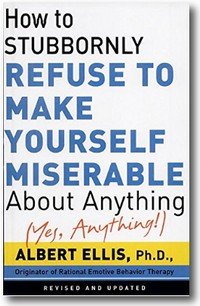“Unconditional” Self Acceptance ???
|
What does “Unconditional” in Unconditional Self Acceptance Mean ??? A reader says that his English teacher advised that he avoid “modifiers” as they weaken the strength of the word they are modifying. So, rather than “Unconditional Self Acceptance (USA)” he just leaves it at “self acceptance.” Nothing wrong with that, but it does raise some interesting questions. |
For quite a long time, I was confused about the phrase Unconditional Self-acceptance, specifically the use of the modifier unconditional. Unconditional appears to function as an adjective implying that self-acceptance is absolute or total or complete or perfect. That’s not very REBT-kosher as we want to avoid such absolutist, perfectionist, overbroad concepts in our thinking and speaking. And, as a practical matter, I think it highly unlikely that–without decades of practice in a Himalayan monastery, anyone could ever achieve such perfect self-acceptance.
However–after Will Ross set me straight on this–I feel quite sure that is not what Dr. Ellis meant. Although unconditional appears to serve as an adjective modifying the nounself-acceptance, I think it is better understood as an adverb modifying self-acceptance which is is better thought of as a verb in this context. In other words, it is something we do; we accept ourselves unconditionally. We do not place conditions on our self-acceptance, which is of course precisely what most of us do most of the time. We accept ourselves conditionally if we are rich, thin, beautiful and famous; if we do well, if we succeed, if we achieve some goal; if we get the girl or the guy, get job, get the hole-in-one. If we meet our (self-imposed) conditions, we feel good about ourselves, and feel bad when we do not. This is precarious because that means our self-esteem is only as high or low as our most recent performance, and can change from moment-to-moment. Perform well, and I am a “good person,” perform poorly and I am a “bad person.” You can see how this is setting a trap for ourselves, setting ourselves up for a crash. If we have a lot of crashes, this can become self-reinforcing leading to chronic low self-esteem.
Substitute words such as unworthy, inadequate, incompetent, stupid, foolish, impotent in place of bad, they amount to the same thing. In the table below, you can see that global ratings fall under several fuzzy, overlapping categories. All of them, reduced to their essence, simply convey the (fictitious) idea of a bad person.
| Category | Examples |
| compassion | asshole, bastard, bitch, asshole, cold-blooded, dickhead, ruthless |
| competence | clumsy, incapable, incompetent, oaf |
| intelligence | idiot, moron, retard, stupid |
| morality | bad, evil, ruthless, wicked |
| political | fascist, nazi, racist, sexist, white supremacist, homophobe and the other xxx-phobes. |
| sexuality | dyke, faggot, frigid, impotent, queer, |
| success, accomplishment | bum, failure, loser, slacker |
| value or worth | bad, no good, useless, worthless |
| vitality | lazy, slacker, low-energy |
The important thing to keep in mind is that these ratings when applied to behavior may (or may not) have meaning (apologies for the tortured adverbs): He behaved stupidly. She did the task incompetently. They danced clumsily. He failed the test. She behaved cruelly. They may or may not be accurate and useful depending on the context and the intent of the person using them. However, when applied globally to a person’s essence or self or personality, they are unkind, unethical, in poor taste and most of all, they have no meaning. They serve merely as “placeholders” to convey contempt and disgust, as well as the desire or outright intention to hurt and harm. It would be more honest and potentially constructive to say “I hate Jones!” than to say “Jones is an asshole!” “I hate Jones!” at least, makes it clear we are expressing a feeling, a personal opinion rather than attempting to “pre-validate” that feeling by invoking some fictitious external entity. We take responsibility when we say “I hate Jones!” rather than using the “clever” device of validating that hatred based on an external: “Of course I hate Jones because the guy is an asshole, after all!” See the difference? It’s subtle, but it packs a wallop.
This is much more than just a matter of style and etiquette. It has real-world effects. In the 2016 U.S. presidential primary elections, then-candidate Donald Trump displayed an uncanny ability to intuit an opponent’s key vulnerability and assign it a nickname . Former governor of Florida and brother of George W. Bush, 43 president of the U.S., Jeb Bush entered the primary contest as the presumptive Republican front-
| Many would argue that Trump’s bestowing the devastating nickname “Low Energy” was in no small part responsible for Bush deciding to exit the race early on. Many fault President Trump–I think correctly–for his vulgar, street fighting tactics of rating; labeling, name calling, nicknaming, smearing and global defaming. However, many of these same people unaccountably seem to have no problem using these very same tactics in their own rhetorical toolbox. So, go figure! |
 |
|
 |
 |
 |
|
 |
 |
 |
 |
 |
 |
|
In his sometimes “shock jock” style, Dr. Ellis described people as “forever fallible fucked-up human beings.” Now, I am pretty sure I know what he meant by that and why he said it, as would anyone who has a familiarity with REBT. However, it is not very elegant, is it? And it certainly is not very REBT-kosher. I don’t know whether Dr. Ellis was being lazy or merely showing respect for his readers intelligence to understand that colorful language used for emphasis is not to be taken literally. Perhaps he just didn’t care. Perhaps he wanted to avoid the role of “word Nazi.” Perhaps while embracing e-Prime, he did not want the semantics to drive the argument and in doing so obscure the more important underlying principle. Whatever, Dr. Ellis certainly did take liberties, as was his perfect right to do so being the developer of REBT and the founder of the Albert Ellis Institute.
However, as an exercise, lets analyze this quote as if it was spoken by Joe Sixpack, not Albert Ellis. Can you identify the two immediate and obvious cognitive distortions?
First is forever which, as they say, is a very long time! It is also a specific cognitive distortion called Fortune Telling. You imagine that you have a crystal ball and can foretell the future. While it is fine to speculate about the future, forever is simply a fallacy. Nothing lasts forever, and in any case there is simply no way we can predict with certainty how long any condition will persist or change into the future. Period. The effect of deciding that something is forever is de-motivating; feelings of being helplessness and hopeless, which is practically definitive of depression. It is always good practice to avoid absolutist, higher order abstractions such as forever, always, never, constantly, etc.
The next, just as obvious is fallible, fucked-up. This colorful language has a impact, to be sure. However, the problem is that it is a global rating, also called downing or self downing as we have discussed previously. No person could be as utterly inadequate and broken as this over-generalization suggests.
Personally, I like Dr. Ellis’s colorful and salty language, and I am in no way tempted to misconstrue his meaning nor his intent. Nor do I relish playing the role of word Nazi myself. However, some casual readers and those with less of a working knowledge of REBT than I might interpret similar non-kosher language in the wrong way and end up confused about some of the REBT basics.
In all due respect to a friend, I have to modify his wording from (“I am forever a fallible, fucked up human being” ) to : “People often and persistently behave fallibly and fuckedupidly.” It is quite difficult to write this stuff in English without sounding goofy. I imagine that is why Dr. Ellis stopped trying to write in ePrime and why revisions of “Guide…” we written in more standard English. My friend thinks I quibble, but it’s not true! This distinction is essential to my world view as well as to my REBT theory and practice: Separating behavior from self. If I, my self, is, say, 98 cents worth of chemicals, or a “soul” or consciousness, an array of atoms, or a bundle of synaptic responses, or any other concept of self that cannot be rated, it CANNOT be forever fallible and fucked up. It simply cannot. Neither can it be whatever the opposite of fallible and fucked up is. It simply is. It does not need to be saved, spiritualized, improved, transcended, reformed, rehabilitated or any of the fashionable things we like to do to the self these days. It is an ontological/existential fact with no qualities other having the characteristic (it is indeed a characteristic) of existence. My 98 cents worth of chemicals are no better and no worse than yours or Jesus Christ’s or even Hitler’s. It is all just universal “stuff” expressing in an infinite variety of ways, no matter how we choose to define it
Now, if we are talking about behavior, that is a horse of a different color! Even in describing, judging behavior, however, it is important to be rational and avoid awfulizing, moralizing and over-generalizing, etc.
As no one knows what or can perfectly agree on exactly what “self” is, you get to choose your own self concept. From an REBT standpoint, it is best to choose one that cannot be rated. The collection of atoms that I call “my self” are neither good nor bad atoms. Simply atoms. Simply universe stuff. Just like yours and everybody else’s!
As I like to offer up in my own smartass way, I go along with that great, 20th Century philosopher, Popeye the Sailor : “I yam what I yam, and dats all what I yam!”
Rex
Khon Kaen, Thailand
Rex@REBTinfo.com

![]()
How useful was this post?
Click on a star to rate it!
Average rating 5 / 5. Vote count: 2
No votes so far! Be the first to rate this post.
Originally posted 2012-12-28 18:19:03.
Contact: Rex@REBTinfo.com
- Tyrany of the Shoulds - Thu 25 Apr 24
- “Sensitive Souls” and Managing Painful Emotions - Wed 24 Apr 24
- Enlightened self-interest??? - Wed 24 Apr 24
Search this site
Sticky Posts
Regular Columns & Features
Recent Comments
Categories
USEFUL LINKS
Amazon Associate Member
Rex Alexander and REBT Info are participants in the Amazon Services LLC Associates Program, an affiliate advertising program designed to provide a means for sites to earn advertising fees by advertising and linking to amazon.com.
Disclosure
When you buy items using the links on this website, we may get a small commission which keeps me in coffee, which keeps me working, which keeps me providing valuable content for you. Thank you for your continuing support of REBT Info.com. ~Rex
TOS / Terms of Service
Pretty basic stuff: No fussing, no fighting, no cussing, no spamming, no scamming, no blaming, no flaming, no hating, no bating, no trolling, no personal attacks. No pornography (Damn!). The Golden Rule applies. Focus on issues, ideas and principles rather than on personalities and you will fit right in. Please keep your contributions friendly and polite, treat your fellow members and readers with respect and all will be well.
All content and information submitted become the property of REBT Info (REBTinfo.com)
Privacy Policy
PRIVACY POLICY
We at REBT Info value your privacy. Your personal information is secure with us. Secure server software (SSL) encrypts all information you enter before it is sent to us, and all of the customer data we collect is protected against unauthorized access.
We WILL NOT sell, rent, distribute or otherwise share your personal information, including e-mail address, to or with anyone for any reason (except in the extremely rare, unlikely case of demands by duly authorized law enforcement acting strictly in accord with due process).
For more information, please read the long version
Copyright
Copyright © 2012-2024 by Rex Alexander dba REBT Info / http://REBTinfo.com.
All rights reserved. The content of this website or any portion thereof may not be reproduced or used in any manner whatsoever
without the express written permission of the publisher except for the use of brief quotations in a book review.Disclaimer
This website, REBTinfo.com, and others under the REBT Info family are for education, information and entertainment purposes only; are not intended as, nor should be regarded as medical or psychiatric diagnosis, advice or treatment.
By accessing this blog you understand and agree to these conditions, as well as to the other Terms of Service / TOS posted, and which may be updated and amended from time-to-time.
Agreement
By accessing this website blog and related media, you affirm that you have read, understand and agree to our Terms of Service / TOS which may be updated and amended from time-to-time.
This is a public blog
Anything you post may be viewed by the public. Therefore, do not post anything you wish to remain private.




